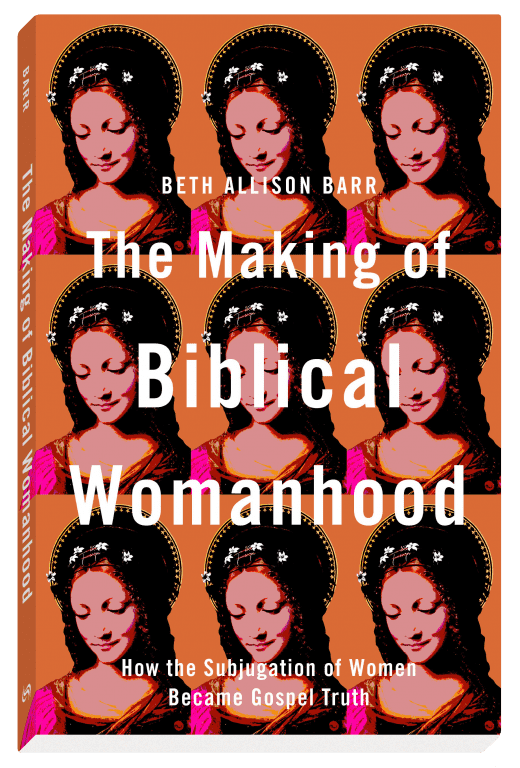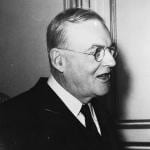“Why do you think that is?” he asked.
The steady stream of hungry students forked around our lunch table, flowing towards the sandwich bar on the left and the hot lunch items on the right. Time has blurred the students into a current of faceless forms. But Dr. Talbert’s piercing eyes gaze just as intently through my memory as if he still sits across that table.
It was 2006 or 2007, and I held a postdoctoral fellowship in the Baylor Religion department. Often, Dr. Charles Talbert, Distinguished Professor of New Testament and a life-long committed Baptist, would invite me to join his lunch group. That day the conversation turned to teaching about women in the early church. I remarked how some verses in 1 Corinthians 14 reminded me of a speech recorded by Livy (which I referenced regularly in my Roman history lectures). The words of the second-century B.C. Roman orator Cato, as Livy recorded in the first century A.D., were just so similar to Paul’s words. Cato, lamenting the behavior of Roman wom en protesting an unpopular law in 195 B.C., exclaimed, “What kind of behavior is this? Running around in public, blocking streets, and speaking to other women’s husbands! Could you not have asked your own husbands the same thing at home?” It isn’t word for word, but Cato’s speech rings remarkably similar to Paul’s words, “If there is anything [women] desire to know, let them ask their husbands at home.”
en protesting an unpopular law in 195 B.C., exclaimed, “What kind of behavior is this? Running around in public, blocking streets, and speaking to other women’s husbands! Could you not have asked your own husbands the same thing at home?” It isn’t word for word, but Cato’s speech rings remarkably similar to Paul’s words, “If there is anything [women] desire to know, let them ask their husbands at home.”
It was at this point when Dr. Talbert interjected.
“Why do you think that is?” he asked me.
Decades of experience teaching and mentoring students gave him patience to wait, gently rapping his fingers on the table as I stared, surprised, back at him. I don’t remember what I said, but moments later he was explaining an interpretation of 1 Corinthians 14 that I–in my more than thirty years of regular attendance at evangelical churches–had never heard before.
In his 1987 article “Biblical Criticism’s Role: The Pauline View of Women as a Case in Point” (The Unfettered Word: Southern Baptists Confront the Authority-inerrancy Question), Talbert argues that verses 34-35 in 1 Corinthians 14 “are Corinthian assertions, reflecting cultural values like those of pagans and Jews; and verse 36 is Paul’s response, rejecting the Corinthian stance about women. Paul’s position here would then be in harmony with that taken in Gal. 3:27, 28, and 1 Cor. 11:2-16. Whereas some Corinthians rejected the participation of women in the leadership of worship, Paul responded with horror.” (67-68)
Or, as I explain it in The Making of Biblical Womanhood: How the Subjugation of Women Became Gospel Truth, Paul w as so concerned that Christians in Corinth were imposing their own cultural restrictions on women that he called them on it. He quoted the bad practice of silencing women, which Corinthian men were trying to drag from the Roman world into their Christian world, and then he countered it. Instead of telling women to be silent, could it be that Paul was actually telling men that–in the brave new world of Jesus–women were allowed to speak?
as so concerned that Christians in Corinth were imposing their own cultural restrictions on women that he called them on it. He quoted the bad practice of silencing women, which Corinthian men were trying to drag from the Roman world into their Christian world, and then he countered it. Instead of telling women to be silent, could it be that Paul was actually telling men that–in the brave new world of Jesus–women were allowed to speak?
“Why haven’t I ever heard this before?” I asked Dr. Talbert, furiously thinking through all the past interpretations I had been taught about 1 Corinthians 14. He just smiled. Later that day he brought me a copy of his Unfettered Word article along with a list of references. I soon realized that Dr. Talbert was only one of many scholars who had been arguing for over a century that the most “plain and literal” understanding of 1 Corinthians 14 was to consider its historical context. From Katherine Bushnell and Helen Barrett Montgomery at the turn of the twentieth-century to Robert Allison, Neal M. Flanagan and Edwina Hunter Snyder, David W. Odell-Scott, Chris Ukachukwu Manus, Walter Kaiser, Charles Talbert, and Lucy Peppiatt, just to name a few, a solid line of renowned Christians scholars have argued that historical context helps make sense of Paul’s words toward women in 1 Corinthians. As Talbert concludes, “it is difficult to see, once the clear meaning of 1 Cor. 14:34-36 is discerned in its first-century context, how anyone today can exclude women from leadership in worship without violating what Scripture meant and means” (70).
Yet this was a line of scholarship that I, at the time of my lunch conversation with Dr. Talbert, knew nothing about.
I had never been taught about Katherine Bushnell, a late nineteenth-century physician, missionary, and biblical scholar. She seems to have been one of the earliest to fully consider 1 Corinthians 14 through the historical context of the Corinthian church as well as the overall picture of Paul’s words to women. Paul was not giving a directive for all time to all women, she observed, because Paul endorsed women praying, prophesying, and leading throughout his letters. As she wrote in God’s Word to Women: “We are driven to believe the Apostle was not uttering his own views in verses 34 and 35 of 1 Corinthians 14, which read: ‘Let the woman keep silence in the churches: for it is not permitted unto them to speak: but let them be in subjection, as also saith the law. And if they would learn anything, let them ask their husbands at home: for it is a shame for women to speak in the church’ (R. V.) We believe this is the language of Judaizers* at Corinth, which has been reported to Paul, and which Paul quotes to answer back in the words: ‘What! came the word of God out from you! or came it unto you only?’ with what follows to the end of the chapter.” Bushnell was not a radical feminist who rejected the authority of scripture. She was, according to New Testament scholar Sharon Dowd, a conservative Methodist who believed the Bible was “inspired,” “infallible,” and “inviolable.” According to Dowd, it was not the Bible that Bushnell believed “suppressed the ministry of women, but rather the ‘sex bias of translators and the ‘antiquated notions’ of ‘fossilized theologians.’ She warned that ‘those who stupidly hinder. . .prophesying on the part of women are placing themselves, as it were, across the path of the fulfillment of God’s Word’ and delaying the coming of Christ.” Isn’t Bushnell fascinating! (If you want to know more about her, I highly recommend A New Gospel for Women: Katherine Bushnell and the Challenge of Christian Feminism by Kristin Kobes Du Mez.)
I had never been taught (at least not before my postdoctoral fellowship) about Helen Barrett Montgomery. She studied Greek and graduated in the first class of Wellesey College in 1884. She became an advocate for international missions and was very active among American Baptists. Did you know that, in 1921, she was elected president of the Northern Baptist Convention–the first female president of any religious denomination in the U.S.? She also translated the Bible in English to help her Sunday School class full of young boys better understand the Gospel of Jesus. It was published as The Centenary Translation in 1924. In her discussion of 1 Corinthians 14:34-35, she reached a conclusion very similar (and possibly inspired) by Bushnell: “This can only refer to the oral law of the Jews, as no such prohibition is found in the Law. Paul is probably quoting a sentence from the Judaizers*.”
I had never been taught about David W. Odell-Scott, Associate Dean and Professor of Religious Studies at Kent State University. In 1983 he create d quite a stir in biblical scholarship when he published an article that made a very similar argument to Bushnell’s and Montgomery’s (although most at this point seemed to have forgotten the pioneering work of these early female scholars). As Odell-Scott wrote, “1 Cor 14:33b-36 is neither inconsistent nor possesses a problem for the status of women as presented in the Pauline corpus. The text does not admonish anyone for allowing women to speak in church. In fact, the text is one of the most emphatic statements for female participation in the membership of the church to be found in the New Testament.” At the time of publication, Odell-Scott was a PhD Candidate at Vanderbilt University. He has since become an established scholar publishing frequently on Paul, including his 2003 Paul’s Critique of Theocracy: A/theocracy in Corinthians and Galatians. Throughout his career, Odell-Scott has remained active in the Disciples of Christ denomination, and, I think it is worth noting, he didn’t question the authenticity of Paul’s authorship of 1 Cor 14:33-36. I think my favorite section of his 1983 article is the conclusion. Just listen to this. “The text is an authentic Pauline passage, consistent with his written work and the Acts account of his life and ministry. The irony of all this is that the very scripture which has for centuries been interpreted as silencing female participation in the worship of the churches, may now be understood as declaring their equality.”
d quite a stir in biblical scholarship when he published an article that made a very similar argument to Bushnell’s and Montgomery’s (although most at this point seemed to have forgotten the pioneering work of these early female scholars). As Odell-Scott wrote, “1 Cor 14:33b-36 is neither inconsistent nor possesses a problem for the status of women as presented in the Pauline corpus. The text does not admonish anyone for allowing women to speak in church. In fact, the text is one of the most emphatic statements for female participation in the membership of the church to be found in the New Testament.” At the time of publication, Odell-Scott was a PhD Candidate at Vanderbilt University. He has since become an established scholar publishing frequently on Paul, including his 2003 Paul’s Critique of Theocracy: A/theocracy in Corinthians and Galatians. Throughout his career, Odell-Scott has remained active in the Disciples of Christ denomination, and, I think it is worth noting, he didn’t question the authenticity of Paul’s authorship of 1 Cor 14:33-36. I think my favorite section of his 1983 article is the conclusion. Just listen to this. “The text is an authentic Pauline passage, consistent with his written work and the Acts account of his life and ministry. The irony of all this is that the very scripture which has for centuries been interpreted as silencing female participation in the worship of the churches, may now be understood as declaring their equality.”
And so, that day in a college dining hall, Charles Talbert changed my life. He helped me see clearly that there was more to understanding the Bible then wha t I had learned in my very narrow Southern Baptist world. He helped me fully realize that respected Biblical scholars who were also faithful Christians interpreted women’s roles in the Bible differently than I had been taught. Yet scholars like him, who I heard pray before our meal every day I joined him for lunch, had not slipped down the feared-evangelical slope into heresy and atheism. Scholars like Charles Talbert still believed in Jesus and the trustworthiness of Scripture just like I did, but they also believed that women could preach, teach, and lead.
t I had learned in my very narrow Southern Baptist world. He helped me fully realize that respected Biblical scholars who were also faithful Christians interpreted women’s roles in the Bible differently than I had been taught. Yet scholars like him, who I heard pray before our meal every day I joined him for lunch, had not slipped down the feared-evangelical slope into heresy and atheism. Scholars like Charles Talbert still believed in Jesus and the trustworthiness of Scripture just like I did, but they also believed that women could preach, teach, and lead.
Of course, I know that D.A. Carson dismissed the Corinthian-quotation theory. In his essay printed in Recovering Biblical Manhood and Womanhood he stated the theory is “doubtful” and accused scholars of proposing Corinthian quotations when “the commentator does not like what Paul is saying.” Carson is just wrong. The theory is not doubtful; it is solidly grounded. Indeed, the historical evidence that Paul is quoting from the backdrop of his Roman world is overwhelming (just read Talbert or my overview in The Making of Biblical Womanhood). It also makes perfect sense with what Paul is doing (correcting the Corinthian church) and aligns with Paul’s rhetorical method. Perhaps the reason Carson doubts the historical reality of Corinthian quotations is due to the motive he ascribes to others–because Carson doesn’t like what Paul is actually saying. After all, when 1 Corinthians 14:33-36 is understood as Paul quoting a bad Corinthian practice and refuting it, it completely undermines complementarian teachings.
I owe so much to Charles Talbert. He helped me fully realize that what I knew as a historian and what I believed as a faithful Christian were more compatible than incompatible. He helped me see how my skills as a historian could help my students better understand their faith. Because of this, I gained the confidence to write The Making of Biblical Womanhood: How the Subjugation of Women Became Gospel Truth. Like Bushnell, I believe that the Bible is the “inspired, infallible, and inviolable” word of God. Yet, also like Bushnell, I believe that the reason women have been pushed out of ministry in evangelical churches is because we have misunderstood, misinterpreted, and even intentionally suppressed the word of God.
Yet, also like Bushnell, I believe that the reason women have been pushed out of ministry in evangelical churches is because we have misunderstood, misinterpreted, and even intentionally suppressed the word of God.
Next month I am going to post on The Anxious Bench the full introduction to my forthcoming book The Making of Biblical Womanhood: How the Subjugation of Women Became Gospel Truth. In the endorsement words of Aimee Byrd, I hope you will “read this book and be challenged and encouraged.” Then I hope you will return to The Anxious Bench and continue with my new series “What Evangelicals Have Never Been Taught…” Like the introduction today, I will show you how much more there is to evangelical understandings of the Bible, Church History, and our traditions than we often have learned.
The world of Jesus is so much bigger than we have imagined it to be. I hope you will join me!
*both Bushnell and Montgomery attribute the quotation to a Jewish source. Most scholars now understand that these types of attributions are misplaced and often reflect anti-semitic attitudes; the quotation source (as I relate above) would be from the Greco-Roman world.
In honor of Charles Talbert as well as the fact I wrote this from the frozen wasteland of Central Texas (I wore fingerless mittens to type), I decided to change the pictures to snow-covered Baylor campus. 2-16/17-2021















